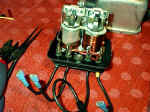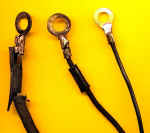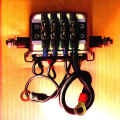
Lucas RB108 Terminator
This is it... The Terminator... This strange
creature that lurks under your seat, and provides you with all the electrical nightmares
you can ever dream off. And If you don't treat it politely it will one day explode and
blow you off your seat.
But if you get to know it, it's actually a likeable little fellow, who will pass on
electrons by the millions with a smile. Several different regulators were used, all
with the same principle. The RB108 is a "modern" replacement for the older MCR1
& MCR2. Basically it does two things: regulates the voltage from the dynamo to a
pre-set level, and cuts off the connection to the battery when the engine is stopped or
running at low rpm. Why? If the voltage was not regulated to around 6v, all lamps would
blow as soon as the engine reved up and the battery would be overcharged and destroyed.
And if the battery was not disconnected at stop & low rpm it would discharge itself
trough the dynamo. So this is why you need it. The alternative to the Lucas is an
electronic device, which does the job without any moving parts or need for adjustments. If
you do not figure out the Lucas or do not like the work involved go for the electronic
replacement.

Here are some basic steps to revive the
original regulator. First of all, is it clean, are all the internal solderings good, are
the contact points clean, are the cable connectors making good contact, are the screws
holding the contact points & springs ok, have any previous owners gone insane with
pliers & hammers? If it passes these exams move on and follow the instruction in the
Haynes Manual or in the BSA Service Sheets. If it is in normal condition it will respond
very well to adjustments and do exactly what it's told to. And once within spec,
subsequent readjustments are easily carried out. Before disconnecting it the first time
colour code the cables and write on the regulator body where they are going.

Cabling: Before & After
After to the left & center :o)
Before doing anything else on the electrical
system, check the old cables and connections. Chances are the former owners have done some
art-work that may look interesting but desperately need first aid (applies to both the
former owners & cabling). Preferably use soldering for every connector, take your time
and do a first class job. You will not regret it, as it can eliminate a dozen of
electrical trouble spots on any bike.
Connection cables are soldered inside the regulator to prevent contact problems. The
original connections or what was left of them were a disaster and much of the initial
charging troubles came from them, not the regulator. The earth point on the frame was
cleaned with emery paper and sprayed with contact cleaner. The RB108 has after this been
very reliable.

RB108 with fuses for dynamo, output & battery
A good idea, but didn't fit behind the oil tank!
If you want some safeguard connect a fuse to at least the battery, & maybe to all the
regulator connections (less earth), 8A should be fine. This will save dynamo, cabling,
battery & regulator in case of a serious short. Use good quality fuseholders and
connectors, and clean them regularly, or they may give you contact problems and demolish
any improvements done in other areas.
|